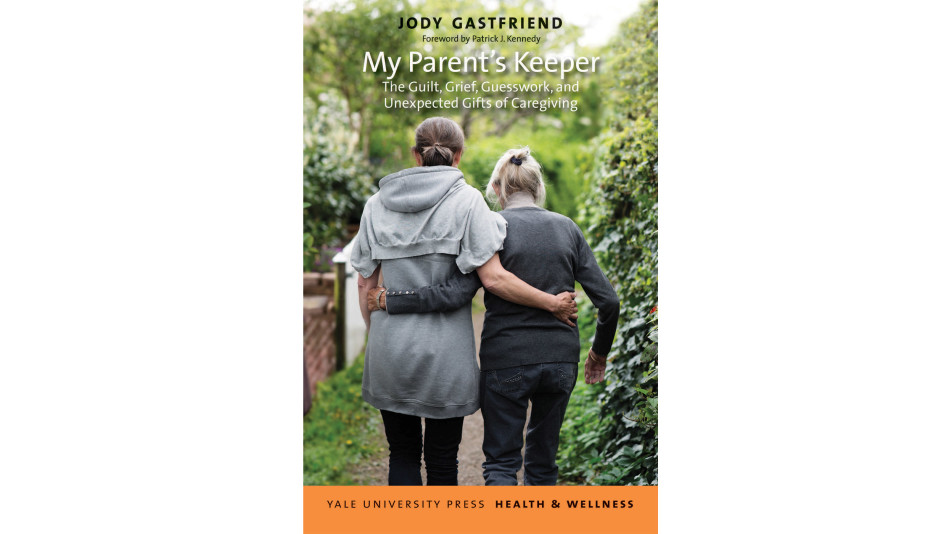Why I Adored My Father's Mistress
A daughter—and author of My Parent's Keeper—tells all about the last few years of her parent's life.

Photo: Pascal Fossier/Getty Images
She was voluptuous, kind and capable. She never quarreled or got upset. She could whip up a delicious five-course meal (with two meat dishes—a celebration in our tradition!) and then enjoy a game of tiddlywinks. And she always, without fail, made my father happy.
Yes, I loved my father's mistress. As did my sister and brother. And my mother loved her too.
It began years ago when my father wandered off from a family gathering and became disoriented. Things started to add up: missed appointments, mistakes with the bills, getting lost driving to the post office. At 74, my father was diagnosed with dementia.
As he worsened, my mother transitioned to the role of full-time caregiver. I did what I could, visiting regularly to help out, but I always felt I wasn't doing enough. Eventually, my mother could no longer care for my dad at home. We made the tough decision. It was time to move my father into a nursing home, where he spent the remaining years of his life.
My father had a PhD in psychology, was a beloved graduate school adviser and was constantly reading and learning. But in the nursing home, he was confined to a wheelchair with little to occupy his once vibrant mind. To pass the time and combat the isolation of dementia, he came up with a remarkable solution. He found an ever-present companion who would always engage him, an imaginary mistress named Cunegonde (pronounced kuh-nee-GUND-uh).
Cunegonde is a fictional character from Candide, written by the 18th-century French satirist Voltaire. Cunegonde was initially idolized by Candide, the illegitimate nephew of a German baron. She was perceived as beautiful, virtuous and attentive, all qualities that my father's imaginary mistress possessed—and then some.
Well, you can imagine my mother's shock when she found out that a beautiful young paramour had been entertaining my father with visits—that, in his mind, were conjugal. When my mother asked my dad what he most appreciated about Cunegonde, he said, "She has beautiful breasts and a good disposition."
"And which is more important?" my mother asked.
"You can't have one without the other!" Dad said.
They both cracked up—proof that years of dementia had not driven a wedge between them. Sometimes, I wondered whether my mother felt jealous that Dad had "taken" a mistress. But Cunegonde was a source of comfort to them both. Lover, companion, caregiver—she provided my father with what my mother could no longer: her constant presence. Cunegonde's existence, if only in his imagination, somehow meant my father never felt alone.
My father was able to thrive, perhaps because the disease had quieted his inner demons. He once told me, "I used to be Type A, but now I'm not. I think senility suits me." He was also able to openly express love, which, pre-dementia, had been hard for him. During her daily visits to the nursing home, my mother was treated to my father's frequent air kisses and uninhibited proclamations of affection.
Average survival after a diagnosis of dementia is about five years, but my father lived another 12. On her visit each day, my mom would caress my father's face while running his electric shaver. Then, while humming a waltz, they would dance with their hands high in the air, even as the rest of my father sat listlessly in his wheelchair. She entered his world and embraced his imagination, which allowed them to travel to exotic places while staying put. She understood that the act of giving and receiving love comes in many forms and need not be extinguished by disease. Early on in their relationship, my parents' love, like that of most married couples, was often strained by the quotidian challenges of life. But that changed with dementia. Although there was great sadness as the disease chipped away at my father's beautiful mind, their bond only grew stronger.
I often wonder how I would respond, were I in my mother's shoes. Would I feel sidelined or betrayed if my husband took an imaginary muse to cope with a devastating disease? A year before my father died, I paid him a birthday visit in the nursing home. He seemed content and at peace. He explained that he was teaching Cunegonde Yiddish and that they had just played a game of Parcheesi. When I asked how it felt to turn 85, my father smiled and said, "Good. My mind is still working. I love food, and I have a good life." This from a man in a nursing home with progressive dementia, eating ground-up food for breakfast, lunch and dinner.
In the final months before my father died, he rarely mentioned Cunegonde. After repeated infections and decline, his life was ebbing away along with his mistress. My family and I were deeply saddened by her disappearance. We knew it heralded a more profound loss to come.
Even now, I often think of Cunegonde. She served many roles: playmate, lover, maternal figure and most of all, as my dad himself explained, solace. I know that what really saved my father was love—both from his imaginary mistress and his real-life true love, who remained his devoted lifeline to the world.

Jody Gastfriend is the author of My Parent's Keeper: The Guilt, Grief, Guesswork, and Unexpected Gifts of Caregiving and vice president of senior care at Care.com.
Yes, I loved my father's mistress. As did my sister and brother. And my mother loved her too.
It began years ago when my father wandered off from a family gathering and became disoriented. Things started to add up: missed appointments, mistakes with the bills, getting lost driving to the post office. At 74, my father was diagnosed with dementia.
As he worsened, my mother transitioned to the role of full-time caregiver. I did what I could, visiting regularly to help out, but I always felt I wasn't doing enough. Eventually, my mother could no longer care for my dad at home. We made the tough decision. It was time to move my father into a nursing home, where he spent the remaining years of his life.
My father had a PhD in psychology, was a beloved graduate school adviser and was constantly reading and learning. But in the nursing home, he was confined to a wheelchair with little to occupy his once vibrant mind. To pass the time and combat the isolation of dementia, he came up with a remarkable solution. He found an ever-present companion who would always engage him, an imaginary mistress named Cunegonde (pronounced kuh-nee-GUND-uh).
Cunegonde is a fictional character from Candide, written by the 18th-century French satirist Voltaire. Cunegonde was initially idolized by Candide, the illegitimate nephew of a German baron. She was perceived as beautiful, virtuous and attentive, all qualities that my father's imaginary mistress possessed—and then some.
Well, you can imagine my mother's shock when she found out that a beautiful young paramour had been entertaining my father with visits—that, in his mind, were conjugal. When my mother asked my dad what he most appreciated about Cunegonde, he said, "She has beautiful breasts and a good disposition."
"And which is more important?" my mother asked.
"You can't have one without the other!" Dad said.
They both cracked up—proof that years of dementia had not driven a wedge between them. Sometimes, I wondered whether my mother felt jealous that Dad had "taken" a mistress. But Cunegonde was a source of comfort to them both. Lover, companion, caregiver—she provided my father with what my mother could no longer: her constant presence. Cunegonde's existence, if only in his imagination, somehow meant my father never felt alone.
My father was able to thrive, perhaps because the disease had quieted his inner demons. He once told me, "I used to be Type A, but now I'm not. I think senility suits me." He was also able to openly express love, which, pre-dementia, had been hard for him. During her daily visits to the nursing home, my mother was treated to my father's frequent air kisses and uninhibited proclamations of affection.
Average survival after a diagnosis of dementia is about five years, but my father lived another 12. On her visit each day, my mom would caress my father's face while running his electric shaver. Then, while humming a waltz, they would dance with their hands high in the air, even as the rest of my father sat listlessly in his wheelchair. She entered his world and embraced his imagination, which allowed them to travel to exotic places while staying put. She understood that the act of giving and receiving love comes in many forms and need not be extinguished by disease. Early on in their relationship, my parents' love, like that of most married couples, was often strained by the quotidian challenges of life. But that changed with dementia. Although there was great sadness as the disease chipped away at my father's beautiful mind, their bond only grew stronger.
I often wonder how I would respond, were I in my mother's shoes. Would I feel sidelined or betrayed if my husband took an imaginary muse to cope with a devastating disease? A year before my father died, I paid him a birthday visit in the nursing home. He seemed content and at peace. He explained that he was teaching Cunegonde Yiddish and that they had just played a game of Parcheesi. When I asked how it felt to turn 85, my father smiled and said, "Good. My mind is still working. I love food, and I have a good life." This from a man in a nursing home with progressive dementia, eating ground-up food for breakfast, lunch and dinner.
In the final months before my father died, he rarely mentioned Cunegonde. After repeated infections and decline, his life was ebbing away along with his mistress. My family and I were deeply saddened by her disappearance. We knew it heralded a more profound loss to come.
Even now, I often think of Cunegonde. She served many roles: playmate, lover, maternal figure and most of all, as my dad himself explained, solace. I know that what really saved my father was love—both from his imaginary mistress and his real-life true love, who remained his devoted lifeline to the world.

Jody Gastfriend is the author of My Parent's Keeper: The Guilt, Grief, Guesswork, and Unexpected Gifts of Caregiving and vice president of senior care at Care.com.



